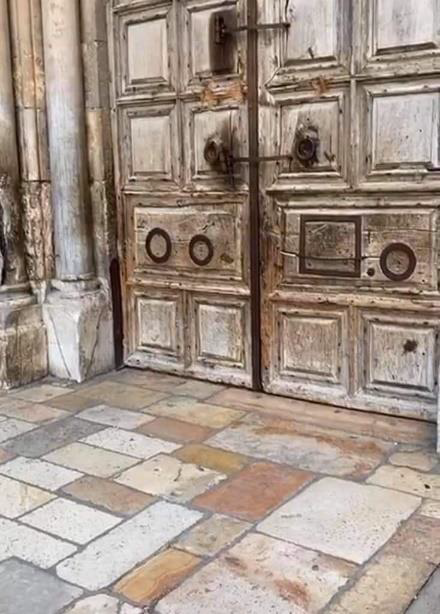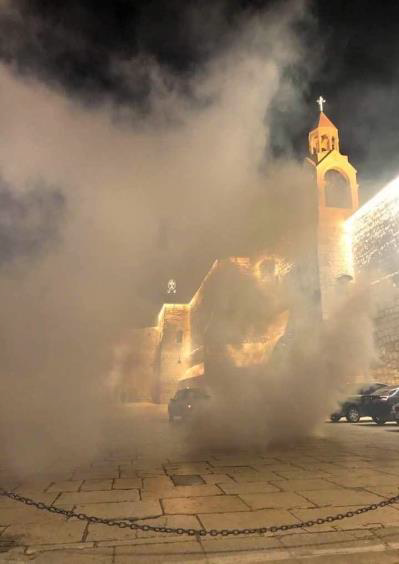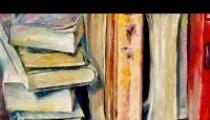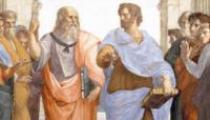
A reflection from the Holy Land
A message from the Latin Patriarchate of Jerusalem:
Reflections from the Holy Land Status Update – Coronavirus
Not in our wildest dreams would have anyone imagined that by now some 50% of humanity is under lockdown, normal life as we have known it came to a standstill in a mere few weeks and none of us can predict what the short term future let alone the longer term future holds for us. What started as a trivial seasonal virus dismissed initially as insignificant would turn in a matter of weeks into a pandemic. Who would have thought that airports would shut down, unemployment would shoot through the skies, the worldwide economy would come so close to near collapse in a mere few weeks? Who would have thought that the developed world with its sophisticated health systems appear to be the least ready to tackle this problem? It is indeed a strange world that we live in that all of a sudden humanity was forced to take a pause, look back, reflect, concentrate on what is important in life, re-discover family and spend more time with family members, and as Archbishop Pizzaballa recently reminded me during a recent meeting “to pray hard as this is the only thing we are allowed to do during the current conditions of lockdowns and curfews”.
On our local scene, the least prepared and severely underequipped Palestinian Authority was the first to declare a state of emergency on March 6 with the discovery of the first cases in a hotel in Bethlehem frequented by tourists. A 30-day lockdown on Bethlehem and closure of all schools in Palestine followed. The Palestinian president and prime minister were heavily criticized for the “overreaction”, but that clearly paid off and as of today the number of cases is still under 75 with one death. Needless to stay the effects on Bethlehem with the abrupt closure of all tourism related businesses took a heavy toll on the economy as unemployment skyrocketed. The number of families in financial distress is exponentially rising and the number of requests received for social assistance has dramatically increased. Eventually we have to invest a lot more in our various humanitarian funds to help families cope and try to put them back on their two feet.
At the present time, there is a bright side that the amount of local support in the form of food packages, medicine, hygiene supplies came to Bethlehem from a number of unexpected sources including nearby communities in Hebron, Reineh in the Galilee, and Zababdeh in the northern part of the West Bank to name a few. Local committees with the assistance of representatives of local charities, municipalities, scout troupes, all worked hard with parish priests to organize themselves and provide as much support to those most in need. A rapid needs assessment was conducted through the parish priests by the social worker of the Latin Patriarchate determined that the greatest needs appear to be for medicine for the chronically ill; diapers and baby formula for children; and pre-paid electric meter cards as many homes are on such a system in the Bethlehem district.
The Catholic Coordination Committee met twice to coordinate the intervention of the Catholic Church and were guided by a clear direction from Archbishop Pizzaballa who is the ex-officio President of the Committee. His instructions were very clear: activate community support first and encourage a local response so neighbors and communities take care of each other, tap local resources, develop clear distribution networks within local communities with the leadership and active participation of the parish priests, and most certainly refrain from launching any international appeals for the time being, at least until after Easter when the real needs become clearer. He is very conscious that the Palestinian people need to rise to the occasion after being recipients of generous international support for so long and during every crisis that hit them, that they do not appear now to be selfish and insensitive, and prematurely start to ask for international help at a time when this is a global suffering, and the local suffering is nothing compared to the suffering elsewhere around the globe where communities have to suffer major waves of human loss! The directions of a wise man that went a long way in defining who we are as a local church with clear ethical and moral standards, as well as what we should and should not be doing as responsible citizens of the globe!
In Jordan, and after a long stretch of no cases, once the first case appeared, the government went immediately in emergency mode and closed all schools starting on March 9, followed by a lockdown declared on March 17 and a complete curfew on March 21. Thus, Jordan came to a standstill, though the number of reported cases has been relatively stable around the 170 mark with no deaths.
Israel on the other hand has been introducing slower measures that kept on being tightened leading to a lockdown imposed on March 26. However, bans on travel started much
earlier as well as school closures. The incremental shutdown has taken its toll with the number of cases increasing five- fold in a span of the past week alone reaching around 2,500 with 5 deaths. It is anticipated that the number of cases will continue to increase dramatically over the next few weeks and many health professionals are warning of a possible collapse of the health system should the cases continue to increase exponentially. On the other hand, Israel, being an economic powerhouse, has introduced a generous stimulus package to help individuals and corporations cope with the economic downturn. The end result, being over 650,000 workers joined the unemployment lines over the past two weeks bringing unemployment to third world standards exceeding 20%.
On our institutional level, since the closures started, we had to abide to whatever governmental regulations were passed in Palestine, Israel and Jordan, which meant that some staff were under lockdown and could not reach their place of employment, some reported to work while others worked from home whenever possible. What we found out very quickly was that despite the great efforts of our IT manager to get everyone connected from home to do business as usual, this exposed the technical and social difficulties of working from home which is certainly easier said that done. Some staff had outdated home computers or none at all, others had weak or no internet connection, yet others who live with extended families and caring for kids who many shifted to learn online simply did not have the time to devote to work related issues. Thus,flexibility was the name of the game, and we had to adjust as personal circumstances warrant and will continue to do that wherever possible. The end result is that despite all the difficulties and through the use of technology, we were able to process the payroll for the month of March on time to ensure that our 1,850 staff in Israel, Palestine and Jordan have the financial resources to at least put one aspect that is on their mind at ease.
On the schools level, the introduction of the new software at the beginning of the school year in September of a new educational platform EduNation meant that online teaching and learning
has become possible despite the evident technology difficulties. Thus, teachers in various locations are engaged with their students to keep the learning process ongoing and keep the students minds stimulated. This certainly is not an ideal situation given that it is the first-time online education is taken from a theoretical mode to a practical mode without much preparation. As we look at developing out schools in the future, this will certainly be an important preparedness element from both a hardware, software and training dimensions that needs further development so that we are better prepared for the next emergency.
And what about the spiritual life... The Church of the Nativity was shut down on March 6, with the Holy Sepulcher following on March 26. Though many churches remain open for individual prayer, religious celebrations and masses are restricted to no more than 10 people, including priests, in attendance. Priests are now using various social media to hold masses per existing schedules, others have them in the open air always abiding to our new social distancing norms. Weddings and funerals cannot have more than ten people participating! Having said that, all celebrations have followed the same old status quo so far and it remains to be seen what format the upcoming Holy Week and Easter celebrations will look like. What will the traditional Palm Sunday and the Good Friday processions through the via Delorosa look like with social distancing and minimal participation? What about the Last Supper at the Gethsemane and Easter Sunday at the Holy Sepulcher if churches remain closed? The faithful seem to have reflected a bit with all that is happening around them and seem to be getting naturally closer back to their faith despite the physical restrictions. After all, there is a bright side to this crazy situation since we are all paying a heavy price as we strayed from our faith and became too greedy, too materialistic, and certainly less human! Gradually, people are rediscovering their faith.
As we wrestle with the current health crisis, loss of jobs, lack of medical and life saving equipment, a crumbling economy, and massive poverty and possible hunger, one is reminded of the symbolism of this holy season leading to holy week and the tragic events of the week leading to the death and resurrection of our savior marking the triumph of good over evil, sin, and death. A new beginning for the Christian faith. Concurrently, our Jewish brothers and sisters will be celebrating Passover in a few weeks commemorating the Exodus of Jews from their enslavement in Egypt; while our Muslim brothers and sisters will also start the holy month or Ramadan which not only symbolizes fasting from sunrise to sunset for 30 days, but a time to reconnect with God, a time to think of the poor and a time of giving. At a time when the most sacred holy places including churches, mosques and synagogues are closed, the faithful will celebrate quietly at home, with family and neighbors. In a Holy Land that has been marred with conflict, fighting, revenge, and an ongoing state of war, ironically the coronavirus ravaging through the world has not discriminated against anyone based on their nationality, religion, color, sex, or any other classification. Thus, we were all equally prone and under attack. The spirit of cooperation amongst enemies brings a new breath of fresh air as Israelis and Palestinians have put all their differences aside to fight a common enemy and to strategize and cooperate together. Wars around the middle east are taking a pause for now. Is there after all a bright side to this health crisis. Will the world emerge a more human one once we start to go back to our normal lives, whenever that happens? Will we learn our lessons and build a more human world for the future generations? One has to be optimistic that Easter, Passover, and Ramadan all coming up in a few weeks will be a time of reflection, deep prayer, and a renewed commitment to a better world to come.
Please keep us in your prayers as we shall continue to keep all around the globe in our prayers. United we shall emerge from this to build a better future. An early Happy Easter, Pesach Sameach, and Ramadan Kareem from the Holy Land!
Sami El-Yousef
Chief Executive Officer
26 March 2020
Share:






